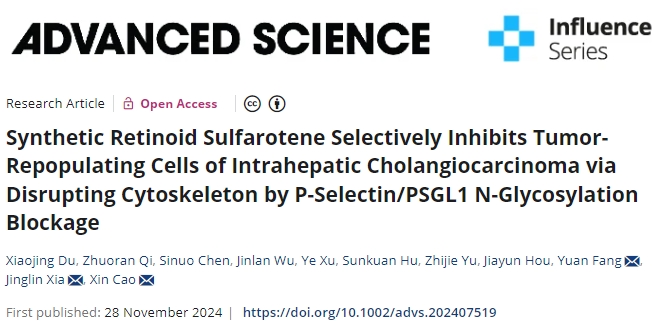预约演示
更新于:2025-07-15
Sulfarotene
硫福罗汀
更新于:2025-07-15
概要
基本信息
原研机构 |
非在研机构 |
权益机构- |
最高研发阶段临床前 |
首次获批日期- |
最高研发阶段(中国)临床前 |
特殊审评- |
关联
100 项与 硫福罗汀 相关的临床结果
登录后查看更多信息
100 项与 硫福罗汀 相关的转化医学
登录后查看更多信息
100 项与 硫福罗汀 相关的专利(医药)
登录后查看更多信息
6
项与 硫福罗汀 相关的文献(医药)2025-01-01·Advanced Science
Synthetic Retinoid Sulfarotene Selectively Inhibits Tumor‐Repopulating Cells of Intrahepatic Cholangiocarcinoma via Disrupting Cytoskeleton by P‐Selectin/PSGL1 N‐Glycosylation Blockage
Article
作者: Yu, Zhijie ; Chen, Sinuo ; Wu, Jinlan ; Hou, Jiayun ; Cao, Xin ; Hu, Sunkuan ; Xia, Jinglin ; Qi, Zhuoran ; Du, Xiaojing ; Xu, Ye ; Fang, Yuan
Abstract:
Intrahepatic cholangiocarcinoma (ICC) is a highly lethal malignancy that currently lacks effective clinical treatments. Eliminating stem cell‐like cancer cells is an extremely promising but challenging strategy for treating ICC. A recently developed synthetic retinoid, sulfarotene, abrogates proliferation, and induces apoptosis of tumor‐repopulating cells (TRCs) that exhibit stem cell‐like properties, yet its effect and underlying mechanisms remain elusive in ICC. It is found that although 5‐fluorouracil, cisplatin, pemigatinib, and gemcitabine all inhibit ICC‐TRCs, sulfarotene demonstrates superior efficacy. Sulfarotene induces retinoic acid receptor alpha (RARɑ) translocation from the cytoplasm to the nucleus, suppressing P‐selectin expression at the transcriptional level. Moreover, it directly interacts with fucosyltransferase 8 (FUT8), inhibiting the core fucosylation of P‐selectin glycoprotein ligand 1 (PSGL1). These actions collectively inhibit ICC‐TRCs via destroying PSGL1‐regulated cytoskeleton. The findings provide a strategy of inhibiting P‐selectin/PSGL1 interaction and altering PSGL1 glycosylation pattern to compromise the cytoskeletal integrity and eliminate ICC‐TRCs.
2024-12-31·Cancer biology & therapy
WYC-209 inhibited GC malignant progression by down-regulating WNT4 through RARα
Article
作者: Wu, Fang ; Lin, Wenfa ; Wu, Jianzhang ; Ke, Kun ; Ye, Zaiyuan ; Qian, Zhenyuan ; Cai, Xufan
Gastric cancer (GC) has been a major health burden all over the world but there are fewer promising chemotherapeutic drugs due to its multidrug resistance. It has been reported that WYC-209 suppresses the growth and metastasis of tumor-repopulating cells but the effect on GC was not explored. MTT, colony formation, and transwell assays were performed to examine the effects of WYC-209 on the proliferation, colony growth, and mobility of GC cells. Western blotting and qRT-PCR were used to detect the expression of proteins and mRNA. RNA-seq and enrichment analyses were conducted for the differentially expressed genes and enriched biological processes and pathways. The rescue experiments were carried out for further validation. Besides, we constructed xenograft model to confirm the effect of WYC-209 in vivo. The dual-luciferase reporter and Chromatin immunoprecipitation were implemented to confirm the underlying mechanism. WYC-209 exerted excellent anti-cancer effects both in vitro and in vivo. Based on RNA-seq and enrichment analyses, we found that Wnt family member 4 (WNT4) was significantly down-regulated. More importantly, WNT4 overexpression breached the inhibitory effect of WYC-209 on GC progression. Mechanically, WYC-209 significantly promoted the binding between retinoic acid receptor α (RARα) and WNT4 promoter. WYC-209 exerts anti-tumor effects in GC by down-regulating the expression of WNT4 via RARα.
2024-11-01·EUROPEAN JOURNAL OF PHARMACOLOGY
WYC-209 suppresses gastric cancer by down-regulating FGF18 via inactivating the STAT3 signaling pathway
Article
作者: Wu, Fang ; Lin, Wenfa ; Wu, Jianzhang ; Ye, Zaiyuan ; Ke, Kun ; Qian, Zhenyuan ; Cai, Xufan
BACKGROUND:
Gastric cancer (GC) is regarded as a major health burden all over the world. WYC-209 inhibits the growth and metastasis of tumor-repopulating cells (TRCs). However, its effectiveness on GC was unexplored. Herein, this study aims to investigate the effect of WYC-209 on GC and elucidate its underlying mechanism.
METHODS:
We examined the effects of WYC-209 on cell survival, migration, invasion, and colony-forming capacities of two GC cell lines (AGS and HGC-27). Subsequently, RNA-seq and enrichment analyses were performed to screen the differentially expressed genes (DEGs) and the enriched signaling pathways. To further explore the underlying mechanism, loss- and gain-function experiments, Chromatin immunoprecipitation, and luciferase reporter were conducted. Finally, xenograft models were constructed to examine the effects of WYC-209 in vivo.
RESULTS:
WYC-209 significantly inhibited cell motility in vitro and tumor growth in vivo. RNA-seq performed in AGS cells after WYC-209 treatment revealed that the inhibition effect of WYC-209 on GCs may be associated with the down-regulation of fibroblast growth factor-18 (FGF18), and pleasantly, FGF18 overexpression abrogated the suppression effect of the drug. In addition, we found that WYC-209 attenuated the activation of the Signal Transducer and Activator of Transcription 3 (STAT3) signaling pathway, and impeded the FGF18 levels expressed in GCs. Importantly, the WYC-209 treatment circumvented the binding of STAT3 to the FGF18 promoter, suggested that WYC-209 down-regulated FGF18 expression via the STAT3 signaling pathway.
CONCLUSION:
Together, our findings presented the promise of WYC-209 in suppressing GC by down-regulating FGF18 expression through inactivating the STAT3 signaling pathway.
1
项与 硫福罗汀 相关的新闻(医药)2024-12-01
11月28日,复旦大学研究团队在期刊《Advanced Science》上发表了题为“Synthetic Retinoid Sulfarotene Selectively Inhibits Tumor-Repopulating Cells of Intrahepatic Cholangiocarcinoma via Disrupting Cytoskeleton by P-Selectin/PSGL1 N-Glycosylation Blockage”的研究论文,本研究中,研究人员发现尽管5-氟尿嘧啶、顺铂、佩米加汀和吉西他滨都能抑制ICC-TRCs,但硫福罗汀的效能更为显著。硫福罗汀能将视黄醇受体α(RARɑ)从细胞质转运至细胞核,并通过转录水平抑制P-选择素的表达。此外,它还能直接与FUT8相互作用。这些作用共同作用,通过破坏PSGL1-调控的细胞骨架来抑制ICC-TRCs。这些发现为通过破坏P-选择素/PSGL1相互作用和改变PSGL1糖基化模式来破坏细胞骨架完整性和消除ICC-TRCs提供了策略。
11月28日,复旦大学研究团队在期刊《Advanced Science》上发表了题为“Synthetic Retinoid Sulfarotene Selectively Inhibits Tumor-Repopulating Cells of Intrahepatic Cholangiocarcinoma via Disrupting Cytoskeleton by P-Selectin/PSGL1 N-Glycosylation Blockage”的研究论文,本研究中,研究人员发现尽管5-氟尿嘧啶、顺铂、佩米加汀和吉西他滨都能抑制ICC-TRCs,但硫福罗汀的效能更为显著。硫福罗汀能将视黄醇受体α(RARɑ)从细胞质转运至细胞核,并通过转录水平抑制P-选择素的表达。此外,它还能直接与FUT8相互作用。这些作用共同作用,通过破坏PSGL1-调控的细胞骨架来抑制ICC-TRCs。
这些发现为通过破坏P-选择素/PSGL1相互作用和改变PSGL1糖基化模式来破坏细胞骨架完整性和消除ICC-TRCs提供了策略。
https://onlinelibrary.wiley.com/doi/full/10.1002/advs.202407519
https://onlinelibrary.wiley.com/doi/full/10.1002/advs.202407519
背景信息
背景信息
01
01
肝内胆管癌(ICC)在中国和东南亚地区发病率尤其高,是仅次于肝细胞癌的原发性肝癌第二大类型,占肝恶性肿瘤的20%左右,占所有消化系统恶性肿瘤的3%。这是一种高度侵袭性和致命的疾病,5年总体生存率(OS)仍维持在9%左右。仅有20%-30%的患者在可切除阶段被诊断出来,但即使经过手术切除,5年生存率也只有约20%-35%。相比之下,大多数不可切除患者的中位生存期(mOS)为11.7个月。尽管手术和系统性治疗的领域正在迅速发展,但治疗效果仍然不佳。因此,迫切需要探索更有效的ICC治疗方法。
肝内胆管癌(ICC)在中国和东南亚地区发病率尤其高,是仅次于肝细胞癌的原发性肝癌第二大类型,占肝恶性肿瘤的20%左右,占所有消化系统恶性肿瘤的3%。这是一种高度侵袭性和致命的疾病,5年总体生存率(OS)仍维持在9%左右。仅有20%-30%的患者在可切除阶段被诊断出来,但即使经过手术切除,5年生存率也只有约20%-35%。相比之下,大多数不可切除患者的中位生存期(mOS)为11.7个月。尽管手术和系统性治疗的领域正在迅速发展,但治疗效果仍然不佳。因此,迫切需要探索更有效的ICC治疗方法。
肿瘤再生细胞(TRCs)代表了一群自我更新能力强、高度肿瘤形成的癌细胞亚群,在癌症的关键事件中发挥着关键作用。这些事件包括维持细胞增殖、抵抗细胞死亡、远距离转移、免疫逃避、代谢重编程、衰老相关分泌表型以及耐药性等。为了消除这些TRCs,本研究小组开发了一种新型合成维甲酸,称为硫福罗汀(WYC-209,SFT)。在体外和体内评估,包括患者来源的异种移植(PDX)模型中,SFT对各种癌症类型的TRCs显示出卓越的抑制作用,因此它被用作潜在的TRCs靶向分子。SFT对TRCs的选择性抑制可能有助于解决上述ICC问题。
肿瘤再生细胞(TRCs)代表了一群自我更新能力强、高度肿瘤形成的癌细胞亚群,在癌症的关键事件中发挥着关键作用。这些事件包括维持细胞增殖、抵抗细胞死亡、远距离转移、免疫逃避、代谢重编程、衰老相关分泌表型以及耐药性等。为了消除这些TRCs,本研究小组开发了一种新型合成维甲酸,称为硫福罗汀(WYC-209,SFT)。在体外和体内评估,包括患者来源的异种移植(PDX)模型中,SFT对各种癌症类型的TRCs显示出卓越的抑制作用,因此它被用作潜在的TRCs靶向分子。SFT对TRCs的选择性抑制可能有助于解决上述ICC问题。
FUT8是ICC-TRCs中SFT的直接靶点
FUT8是ICC-TRCs中SFT的直接靶点
02
02
糖基化是在细胞内质网/高尔基体中的一种酶促过程,是蛋白质翻译后修饰的主要方式之一,由不同的糖基转移酶和/或糖苷酶催化。鉴于SFT对RARɑ的影响,研究人员首先推测它可能通过增加核内RARɑ的转运来调节糖基转移酶/糖苷酶的转录。经过交集运算后,研究人员重点关注了MGAT3基因,它是N-乙酰葡萄糖胺转移酶III的编码基因,通过β1,4糖苷键将N-乙酰葡萄糖胺连接到β-岩藻糖上,从而催化N-糖链核心的三糖N-甘露糖的β1,4糖苷键的形成。RNA-seq和qRT-PCR数据表明,SFT处理显著降低了ICC-TRCs中MGAT3 mRNA的水平,但在2D ICC细胞中未见明显变化。因此,研究人员使用siRNA沉默ICC-TRCs中的MGAT3。然而,沉默MGAT3未能抑制PSGL1的糖基化、细胞球体的生长、迁移和侵袭。这些结果表明,MGAT3的变化只是SFT治疗后的附加效应,而不是SFT抑制ICC-TRCs的原因。
糖基化是在细胞内质网/高尔基体中的一种酶促过程,是蛋白质翻译后修饰的主要方式之一,由不同的糖基转移酶和/或糖苷酶催化。鉴于SFT对RARɑ的影响,研究人员首先推测它可能通过增加核内RARɑ的转运来调节糖基转移酶/糖苷酶的转录。经过交集运算后,研究人员重点关注了MGAT3基因,它是N-乙酰葡萄糖胺转移酶III的编码基因,通过β1,4糖苷键将N-乙酰葡萄糖胺连接到β-岩藻糖上,从而催化N-糖链核心的三糖N-甘露糖的β1,4糖苷键的形成。RNA-seq和qRT-PCR数据表明,SFT处理显著降低了ICC-TRCs中MGAT3 mRNA的水平,但在2D ICC细胞中未见明显变化。因此,研究人员使用siRNA沉默ICC-TRCs中的MGAT3。然而,沉默MGAT3未能抑制PSGL1的糖基化、细胞球体的生长、迁移和侵袭。这些结果表明,MGAT3的变化只是SFT治疗后的附加效应,而不是SFT抑制ICC-TRCs的原因。
研究人员从HUCCT1-TRCs中提取总蛋白,并用DMSO或SFT(1 mm)处理。经胰蛋白酶消化后,使用质谱进行分析。生物信息学分析确定这些4047个肽段代表了1791种不同的蛋白质。随后,使用数据库将蛋白质转换为对应的编码基因。将它们与糖基转移酶或糖苷酶编码基因进行交集,总共获得了10个潜在的直接靶点,包括OGT、MGAT2、GALNT2、GALNT6、GALNT7、PIGT、FUT8、POFUT1、ALG2和UGGT1。RNA-seq数据表明,SFT治疗后这些基因的表达没有显著变化。研究人员推测,SFT可能通过直接与它们结合来调节酶的活性。
研究人员从HUCCT1-TRCs中提取总蛋白,并用DMSO或SFT(1 mm)处理。经胰蛋白酶消化后,使用质谱进行分析。生物信息学分析确定这些4047个肽段代表了1791种不同的蛋白质。随后,使用数据库将蛋白质转换为对应的编码基因。将它们与糖基转移酶或糖苷酶编码基因进行交集,总共获得了10个潜在的直接靶点,包括OGT、MGAT2、GALNT2、GALNT6、GALNT7、PIGT、FUT8、POFUT1、ALG2和UGGT1。RNA-seq数据表明,SFT治疗后这些基因的表达没有显著变化。研究人员推测,SFT可能通过直接与它们结合来调节酶的活性。
硫福罗汀直接与FUT8结合
硫福罗汀直接与FUT8结合
为了确定直接靶点,研究人员评估了ICC中10个潜在靶点的重要性。差异分析显示,OGT、GALNT2、GALNT6、GALNT7、PIGT、FUT8、POFUT1、ALG2和UGGT1在ICC组织中的表达水平高于正常组织。生存分析显示,只有FUT8与患者的总生存期(OS)和无复发生存期(RFS)显著相关。SFT治疗不会对FUT8的mRNA或蛋白水平产生显著影响。研究人员通过将这10个残基替换为ALA构建了突变型FUT8,并纯化了FUT8WT和FUT8MT蛋白。MST数据表明,SFT与FUT8WT蛋白具有很强的亲和力,但与FUT8MT蛋白的亲和力降低,Kd值分别为9.83E-08和2.83E-07。模拟对接数据表明,SFT与SER245、ASN247、GLY253、THR267形成稳定的氢键相互作用,与ILE242、TRP255、PRO261形成疏水相互作用。因此,SFT可能直接与ICC-TRC中的FUT8结合。
为了确定直接靶点,研究人员评估了ICC中10个潜在靶点的重要性。差异分析显示,OGT、GALNT2、GALNT6、GALNT7、PIGT、FUT8、POFUT1、ALG2和UGGT1在ICC组织中的表达水平高于正常组织。生存分析显示,只有FUT8与患者的总生存期(OS)和无复发生存期(RFS)显著相关。SFT治疗不会对FUT8的mRNA或蛋白水平产生显著影响。研究人员通过将这10个残基替换为ALA构建了突变型FUT8,并纯化了FUT8WT和FUT8MT蛋白。MST数据表明,SFT与FUT8WT蛋白具有很强的亲和力,但与FUT8MT蛋白的亲和力降低,Kd值分别为9.83E-08和2.83E-07。模拟对接数据表明,SFT与SER245、ASN247、GLY253、THR267形成稳定的氢键相互作用,与ILE242、TRP255、PRO261形成疏水相互作用。因此,SFT可能直接与ICC-TRC中的FUT8结合。
为了研究FUT8在ICC-TRCs中的作用,研究人员使用特异性的sgRNAs在HUCCT1-TRCs中敲低FUT8。FUT8的缺失显著抑制了HUCCT1-TRCs的克隆球体形成、迁移和侵袭,降低了F-肌动蛋白荧光强度和F/G-肌动蛋白比率,并降低了HUCCT1-TRCs中糖基化的PSGL1蛋白的表达。此外,研究人员将空载体、FUT8WT或FUT8MT质粒转染到FUT8敲除的HUCCT1-TRCs中。研究人员发现,SFT治疗只能将PSGL1从约70 kDa降至约35 kDa,而在FUT8敲除的HUCCT1-TRCs或FUT8MT HUCCT1-TRCs中,效果不明显。此外,SFT治疗在FUT8WT HUCCT1-TRCs中产生了最强的抑制作用,包括克隆球体形成、迁移和侵袭,以及F/G-肌动蛋白比率,而在FUT8KO HUCCT1-TRCs或FUT8MT HUCCT1-TRCs中产生了较弱的抑制作用。综上所述,抑制FUT8的活性是SFT抑制ICC-TRCs的另一种机制。
为了研究FUT8在ICC-TRCs中的作用,研究人员使用特异性的sgRNAs在HUCCT1-TRCs中敲低FUT8。FUT8的缺失显著抑制了HUCCT1-TRCs的克隆球体形成、迁移和侵袭,降低了F-肌动蛋白荧光强度和F/G-肌动蛋白比率,并降低了HUCCT1-TRCs中糖基化的PSGL1蛋白的表达。此外,研究人员将空载体、FUT8WT或FUT8MT质粒转染到FUT8敲除的HUCCT1-TRCs中。研究人员发现,SFT治疗只能将PSGL1从约70 kDa降至约35 kDa,而在FUT8敲除的HUCCT1-TRCs或FUT8MT HUCCT1-TRCs中,效果不明显。此外,SFT治疗在FUT8WT HUCCT1-TRCs中产生了最强的抑制作用,包括克隆球体形成、迁移和侵袭,以及F/G-肌动蛋白比率,而在FUT8KO HUCCT1-TRCs或FUT8MT HUCCT1-TRCs中产生了较弱的抑制作用。综上所述,抑制FUT8的活性是SFT抑制ICC-TRCs的另一种机制。
结语
结语
03
03
本研究揭示了P-选择素/PSGL1轴在ICC中通过重塑细胞骨架促进干细胞特性的新作用。研究人员还发现了硫福罗汀选择性抑制ICC-TRCs的新机制。这些发现扩大了硫福罗汀在癌症治疗中的潜在应用。(转化医学网360zhyx.com)
本研究揭示了P-选择素/PSGL1轴在ICC中通过重塑细胞骨架促进干细胞特性的新作用。研究人员还发现了硫福罗汀选择性抑制ICC-TRCs的新机制。这些发现扩大了硫福罗汀在癌症治疗中的潜在应用。(转化医学网360zhyx.com)
【参考资料】
【参考资料】
https://onlinelibrary.wiley.com/doi/full/10.1002/advs.202407519
https://onlinelibrary.wiley.com/doi/full/10.1002/advs.202407519
【关于投稿】
【关于投稿】
转化医学网(360zhyx.com)是转化医学核心门户,旨在推动基础研究、临床诊疗和产业的发展,核心内容涵盖组学、检验、免疫、肿瘤、心血管、糖尿病等。如您有最新的研究内容发表,欢迎联系我们进行免费报道(公众号菜单栏-在线客服联系),我们的理念:内容创造价值,转化铸就未来!
转化医学网(360zhyx.com)是转化医学核心门户,旨在推动基础研究、临床诊疗和产业的发展,核心内容涵盖组学、检验、免疫、肿瘤、心血管、糖尿病等。如您有最新的研究内容发表,欢迎联系我们进行免费报道(公众号菜单栏-在线客服联系),我们的理念:内容创造价值,转化铸就未来!
转化医学网(360zhyx.com)发布的文章旨在介绍前沿医学研究进展,不能作为治疗方案使用;如需获得健康指导,请至正规医院就诊。
转化医学网(360zhyx.com)发布的文章旨在介绍前沿医学研究进展,不能作为治疗方案使用;如需获得健康指导,请至正规医院就诊。

临床结果临床研究
100 项与 硫福罗汀 相关的药物交易
登录后查看更多信息
研发状态
临床结果
临床结果
适应症
分期
评价
查看全部结果
| 研究 | 分期 | 人群特征 | 评价人数 | 分组 | 结果 | 评价 | 发布日期 |
|---|
No Data | |||||||
登录后查看更多信息
转化医学
使用我们的转化医学数据加速您的研究。
登录
或

药物交易
使用我们的药物交易数据加速您的研究。
登录
或

核心专利
使用我们的核心专利数据促进您的研究。
登录
或

临床分析
紧跟全球注册中心的最新临床试验。
登录
或

批准
利用最新的监管批准信息加速您的研究。
登录
或

特殊审评
只需点击几下即可了解关键药物信息。
登录
或

生物医药百科问答
全新生物医药AI Agent 覆盖科研全链路,让突破性发现快人一步
立即开始免费试用!
智慧芽新药情报库是智慧芽专为生命科学人士构建的基于AI的创新药情报平台,助您全方位提升您的研发与决策效率。
立即开始数据试用!
智慧芽新药库数据也通过智慧芽数据服务平台,以API或者数据包形式对外开放,助您更加充分利用智慧芽新药情报信息。
生物序列数据库
生物药研发创新
免费使用
化学结构数据库
小分子化药研发创新
免费使用


